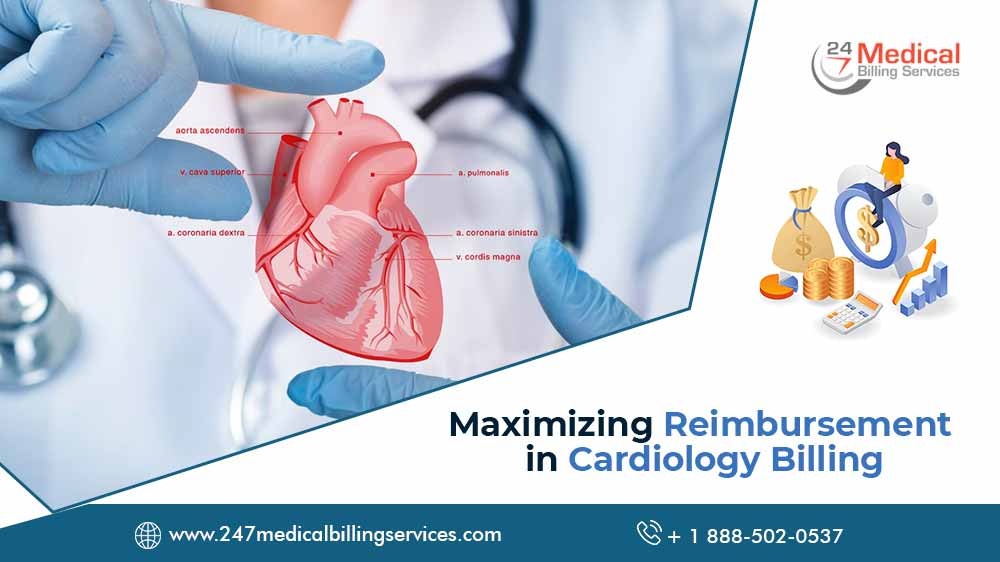
Maximizing Reimbursement in Cardiology Billing
Every practitioner gets their own set of challenges in terms of billing and so is the cardiology billing. Undoubtedly, there will always be professional obstacles for doctors and other healthcare professionals. But now those issues have expanded to the financial statements, with billing becoming a challenging task as the sector switches from cost to value-based fee structures. To increase collections, a focus on billing procedures is becoming increasingly important. As a medical practitioner, specific responsibilities need to be taken care of and reimbursement in cardiology billing should be one of them. Let's look at the reasons why reimbursement in cardiology billing is complex:
1. Lack of authorization
Overworked cardiology billing and office employees sometimes hurry through or neglect screening for authorizations, precepts, and referrals. This might end up costing the practice a lot of money. Your organization may avoid denials on the latter end of the cardiology billing process by putting in the appropriate effort up front.
2. Absence of Modifiers
A frequent error is forgetting to use the appropriate modifiers. Cardiologists have a hard time keeping up with the constantly evolving coding standards. Missing a modifier increases the labor required to tidy up the claim and may cause a refusal or delay in payment.
3. Coverage Principles
Like the first issue, many physicians overlook reviewing coverage policies before treatments and testing. It affects patient satisfaction in addition to how much is paid out. The practice is in charge of comprehending a patient's coverage. To guarantee there are no surprises, your staff should be ready to educate patients before operations and tests.
4. Poor management
Another reason to lose the reimbursement is the poor management of the staff involved in the cardiology billing and coding operations. Information is lost due to careless front-end operations, and improper billing results in revenue shortages. Many medical professionals have encountered this issue repeatedly, and ensuring adequate front-end protocols makes it simpler to bill effectively on the back end. There is a need to work with workers upfront to ensure that all of the data being gathered is accurate and key to solving the billing problems.
Ways to maximize reimbursement in cardiology billing
1. Get better at negotiating
Negotiation is an art. Take a hard look at what your most visited payers are paying you. If you think the numbers do not look satisfactory, it could be time to discuss your contract if it's less than what you're getting from others or what you think you deserve. However, don't get into those discussions unprepared. Do your research by gathering as much evidence as possible to support your claims.
2. Adopt the latest technology
Technology is an excellent tool if handled correctly. It might take a while to get the hang of some tools or codes, but it's hugely beneficial in the long run. Nowadays, nearly all payers accept electronic claims, and Medicare mandates their use. That implies you have no justification for continuing to use pen and paper to keep a record. It has become an obsolete thing now.
It is time to go electric. Payment processing typically takes two weeks for electronic claims and approximately 8 weeks for paper ones. And, as you own that money, don't you want to get it sooner? Therefore, switch to electronic claims and develop electronic remittance advice while you're at it. The entire cardiology billing and coding procedure will go much more smoothly.
3. Seek professional help
Human oversight and mistakes are obvious. But there is a backup plan that always works, i.e., outsource cardiology billing and coding professionals to handle your bills. Any cardiology billing service worth its salt provides full-service solutions, including automation to eliminate claim mistakes, dependable carrier follow-up to assure full payment, and customized reports to provide you with real-time access to your company's financial health. That's what defines making the most of your reimbursement.
Professional help will also give you the most deserving peace of mind and extra time. Since you will be caught up in cardiology billing rigamarole, you can focus on your patients and their well-being.
How Can Cardiology Billing and Coding Be Improved?
Cardiology coding and billing are required to run a successful healthcare facility. Faster reimbursement, consistent audits, and smooth revenue cycles result from accurate coding.
Highly trained personnel, periodic audits, and a thorough understanding of diagnostic tools and complex technology are critical for optimizing cardiology billing and coding systems. Outsourcing cardiology coding and billing to 24/7 Medical Billing Services and closely following cardiology coding guidelines may be your safest and most promising option for this purpose. Cardiology billing company experts are highly trained in cardiology and are the most trustworthy candidates to handle your data.
This will also ensure that you receive high-quality coding and billing services, as well as revenue cycle management strategies that minimize errors and streamline the reimbursement process.

.png)